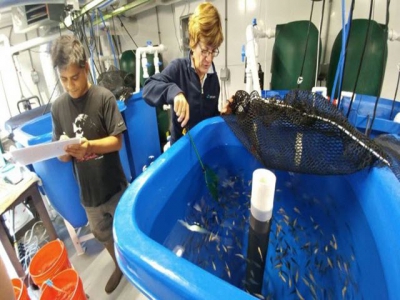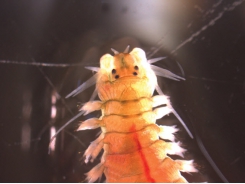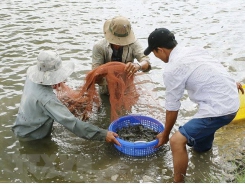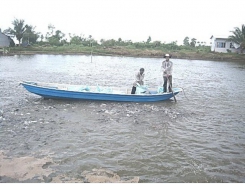Marine microalga may make aquafeeds more sustainable

Marine microalgae are excellent sources of essential amino acids, minerals, vitamins and omega-3 fatty acids.
Dartmouth researchers Pallab Sarker and Anne Kapuscinski, who is now at UC Santa Cruz, conducting sustainable aquaculture research with Nile tilapia. Photo Credit: Image by Devin S. Fitzgerald.
Dartmouth University scientists have created a more sustainable feed for aquaculture by using a marine microalgae co-product as a feed ingredient, according to an announcement. The study is the first of its kind to evaluate replacing fish meal with a co-product in feed designed specifically for Nile tilapia. The results were published in the open-access journal PLOS ONE.
Aquaculture is the world's fastest-growing food sector, surpassing the global capture fisheries production in 2014. It provides more than 50% of the food supply to people; however, it poses several environmental concerns, Dartmouth said. Aquaculture feed (aqua feed) draws on 70% of the world's fish meal and fish oil, which are obtained from small, ocean-caught fish such as anchovies, sardines, herring, menhaden and mackerel that are essential to the lower end of the marine food chain.
According to the university, analysts project that by 2040, the demand for fish meal and fish oil will exceed supply. Aqua feeds also draw on large amounts of soy and corn, which pose other environmental concerns due to the use of fertilizers and potential runoff into rivers, lakes and coastal waters, Dartmouth said.
To address the environmental sustainability concerns regarding aqua feed, a Dartmouth team has been developing sustainable feeds for Nile tilapia to examine the effectiveness of replacing fish meal and fish oil with different types of marine microalgae, the announcement said.
Marine microalgae are excellent sources of essential amino acids, minerals, vitamins and omega-3 fatty acids and can meet the nutrient requirements of fish, the researcher said. Omega-3 fatty acids are important for maintaining fish health.
The Dartmouth research team's latest work replaces fish meal with a marine microalgae co-product, Nannochloropsis oculata, which is rich in both protein and omega-3 fatty acids -- including eicosapentaenoic acid (EPA) -- that are essential to fish growth and quality.
Algae meal is the co-product left over after the oils have been extracted from commercially grown algae biomass to manufacture nutraceuticals, chemicals and fuel applications, the researchers said. The co-product is available at commercial scale, and continued increases in supply are expected.
According to the university, the study's findings show promise in replacing conventional protein ingredients in tilapia feeds.
The results demonstrated that the co-product had higher protein content than the whole cells but had lower digestibility than whole cells. The co-product showed the highest digestibility of lysine, an essential amino acid that is often deficient in terrestrial crop-based aqua feed ingredients, as well as the highest EPA digestibility, the researchers said.
The team also evaluated several feeds with varying percentages of co-product replacing fish meal. When 33% of fish meal was replaced with the co-product, the Nile tilapia had growth, feed conversion ratio and survival rates similar to those on the reference diet for which fish meal comprised 7% of the diet.
The research team suggested that the co-product may need to be enhanced with enzyme(s) to maximize nutrient availability and counter the lower digestibility observed in the experiment.
"The possibilities for developing a sustainable approach to aquaculture are exciting. Our society has an opportunity to shift aqua feed's reliance on fish-based ingredients to a fish-free product that is based on marine microalgae, and our findings provide new insight into how we can get there," lead author and Dartmouth research assistant professor Pallab Sarker said.
The research builds on the team's earlier work developing a marine microalga feed for Nile tilapia made from Schizochytrium sp., which evaluated how the feed affected digestibility and growth. The results demonstrated that Schizochytrium was highly digestible lipid and DHA, an omega-3 fatty acid source for tilapia. When Schizochytrium fully replaced the fish oil, the tilapia not only had greater weight gain but better feed conversion compared to those on a control diet containing fish oil.
As part of the team's goal to eliminate aqua feed's reliance on marine fish and terrestrial crop inputs, they are combining Nannochloropsis co-product with other marine microalgae to make aqua feeds more sustainable, Dartmouth said.
Có thể bạn quan tâm
Phần mềm

Phối trộn thức ăn chăn nuôi

Pha dung dịch thủy canh

Định mức cho tôm ăn

Phối trộn phân bón NPK

Xác định tỷ lệ tôm sống

Chuyển đổi đơn vị phân bón

Xác định công suất sục khí

Chuyển đổi đơn vị tôm

Tính diện tích nhà kính

Tính thể tích ao hồ




 Tra fish exports to US enjoy strong surge
Tra fish exports to US enjoy strong surge  Polychaete worms reduce waste, provide food in aquaculture
Polychaete worms reduce waste, provide food in aquaculture